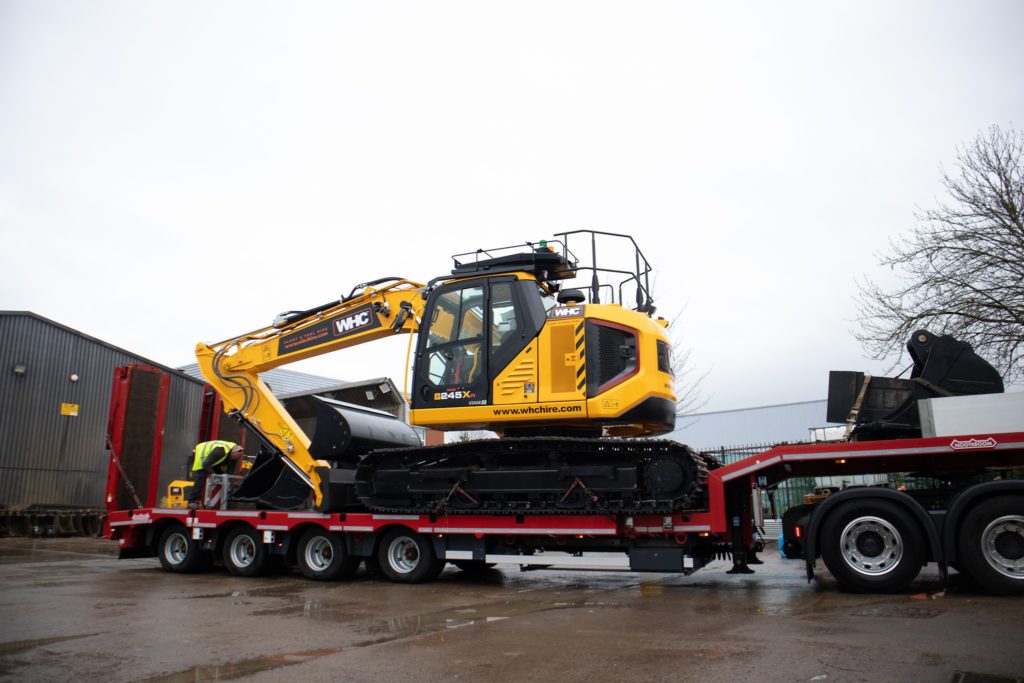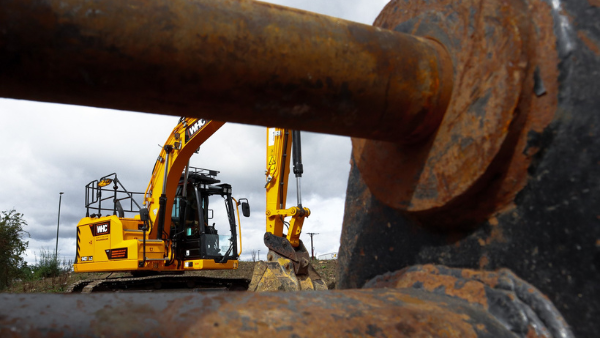Large Excavator Hire For Construction Projects- Where To Start
A large excavator is an essential piece of plant equipment that is used throughout a whole construction project. They range in several sizes to maximise cycle time and productivity throughout; all of which we will be covering in this article. No matter how much experience you have as an operator you are sure to find a few hacks throughout this resource when it comes to large excavator hire.
Let’s get digging.
What is classed as a large excavator?
No matter where you research for your excavator hire, suppliers will have their own perception of what is classed as a large excavator. This could be simply down to the range of excavators that they offer. So don’t be surprised when you type into google “large excavator hire” and are getting results of 5 Ton machines upwards.
Nevertheless, large excavators can be categorised on a general basis as machines that have an operating weight of over 10T. You can expect these machines to offer a digging depth of over 4m as standard, with a load capacity of around 1500kg. The overall reach, lifting weight and capacity only increases the larger the excavator you choose.
The cost to hire a large excavator?
The cost of large excavator hire fluctuates depending on which supplier you choose. As an example, one of the most popular large excavators to hire in construction is a 14T excavator. Machines of this size can attract a cost from around £560.00 +Vat per week (2024), with the price only increasing as the excavator size increases.
It is important to note that all suppliers are different in how they cost their equipment. However, you should always be mindful of the quality of machinery and support you receive with your hire. Choosing older machinery can lead to unnecessary breakdowns whilst in your possession. It is always best advised to choose a supplier that offers newer equipment to reduce the possibility of issues occurring.
Benefits of a large excavator?
Choosing a large excavator for your construction project comes with many benefits such as:
Larger loading capacities
Large excavators offer far more substantial loading capacities per bucket. This means that you can move far more bulk per load compared to a midi or mini excavator. Larger loads result in better efficiency and faster completion time.
Cost-effective
Large excavators are far more cost-effective compared to mini, and midi machines. To produce the same amount of productivity, you will require multiple machines to match a single large excavator. Therefore if your project permits you to do so, opting for a large excavator can be far more beneficial in the long run.
Range of machinery to choose from
The range of large excavators is ever-expanding to meet the needs and demands of today’s construction requirements. The type of manufacturer and age of the machine will determine its overall efficiency as in any market, there is always a battle to be the best.
It is quite common to find large excavators ranging from 10-30T from all major manufacturers. The largest excavators being produced on the market come from the likes of Bucyrus (owned by Caterpillar). However, these types of machines are not necessarily suitable for construction use.
Most commonly, you can expect to use machines ranging from Micro-40T throughout an entire construction project. Depending on what phase you are working on, will determine the size and weight limit you may be able to use.
Nevertheless, manufacturers have made it easier for construction operatives to become efficient with larger equipment. Here’s how:
The types of large excavator available
There are three main types of large excavators that you can expect to hire. All of which have been designed for different applications, during various stages of construction.
Conventional Tail Swing
Conventional tails wing excavators operate with a large rear counterweight profile. This means that when the machine is in use, it can lift larger heavier loads as the weight is situated further from the pivoting point. The counterweight extends over the machine’s tracks to provide a low centre of gravity. These machines are ideal to use in the early stages of construction where there are a low number of hazards.
Reduced Tail Swing
A reduced tail swing excavator operates with a smaller counterweight and design that extends only slightly over the tracks of the excavator. Unlike a conventional machine, there is a huge reduction in tail swing and the addition of a dozer blade. The dozer blade acts as an addition to avoiding the machine flipping while in use.
However, with a reduced counterweight, there is an overall reduction in performance. Generally, their lifting capabilities are reduced in terms of load-bearing weight. Besides this, there has been a massive increase in the use of reduced tail swing excavators, as they are suitable for all construction phases.
Not only are these types of machines able to lift a significant weight, but they are also able to work in far smaller spaces compared to conventional machines. Bringing big lifting and loads to the smallest of space.
Zero Tail Swing
The latest generation of excavators comes in the terms of zero tail swing machines. These excavators house the complete body of the equipment within its tracks, with zero overhangs. What this means is that excavators like this can work in the smallest of spaces. Due to having a smaller counterweight, their overall lifting capabilities are lowered compared to a reduced tail swing excavator.
This feature is rare to find in large excavators for construction, however, with the ever-developing market, it won’t be long until they become far more accessible.
Examples of large excavator applications
Large excavators can be used for several different applications such as:
- Digging trenches
- Digging foundations
- Removal of contaminated soil
- Levelling large amounts of ground
- Grading banks
- Loading or unloading lorries
- Demolition projects
- Lifting heavy materials in and around a construction site
- Dredging rivers
- Excavating ponds or pools
- And much more.
With interchangeable buckets suitable for each application, it’s quite clear to see why large excavators play such an important role in construction.
How are large excavators transported (UK)?
An important thing to consider if you are hiring a large excavator, is how are you going to get it to you? The most common way to transport a large excavator in the UK is by road. This is generally organised by the excavator hire service that you are working with.
However, there are some important things you need to know about transporting an excavator on the road. Some large excavators, when transported, can be classed as an abnormal load.
This is any vehicle that has any of the following:
- a weight of more than 44,000kg
- an axle load of more than 10,000kg for a single non-driving axle and 11,500kg for a single driving axle
- a width of more than 2.9 metres
- a rigid length of more than 18.65 metres
(https://www.gov.uk/esdal-and-abnormal-loads)
If your excavator exceeds any of the following criteria, then a movement notice is required by the hire company to transport the machinery to you. What does this mean for you?
Additional costs
Depending on your supplier, they may charge you an additional admin fee to arrange the movement notice.
Slower delivery
Larger abnormal loads cannot be transported immediately. It is always best to book delivery of your large excavator weeks in advance to guarantee that it arrives on time. Plant hire suppliers will need to submit a moving notice and notify the police, highway authorities and the also the bridge and structural owners along the route. Meticulous planning is required to ensure the machinery is delivered safely.

Questions to ask if you consider hiring a large excavator?
If you are thinking about hiring a large excavator for your construction project, then asking these questions can help you get off on the right foot:
How much is the hire going to cost?
Knowing the rates of the machinery is key to your budgeting phases. If you require the machinery for a long period, you may be entitled to long-term hire discounts.
What is included in the hire?
Ensure everything is included in the price that you are quoted. This could include the types of buckets or attachments you need along the way. It is also a great place to understand the value you get from your supplier. What support systems do they have in place?
What type of excavator is going to arrive?
How old is the machinery, is it old and tired or is it worth its hire value? Manufacture and model are always useful for you to understand. Be sure to check out the specifications of the machinery to guarantee you make the right choice for your project.
When can the machinery be delivered?
As we previously touched on, hiring large or multiple large machines, your supplier may have to arrange a movement notice as the loaded machinery, along with all its fuel and buckets could exceed the normal limit.
How to off-hire?
Make certain you understand the full terms of your hire contract with your supplier. This will include the correct method to off-hire the machinery. Failure to do so may incur additional costs you may not have budgeted for.
Do you need an account?
It is not always the case that credit accounts are required to hire large excavators. Nevertheless, this is down to the discretion of the supplier you choose to work with. There is no doubt that if a company agrees to hire a piece of machinery, they want to know that their asset is safe, and at some point going to return. Hence why is normally common practice to open an account with your supplier before hiring large excavators.
Where can you hire a large excavator in the UK?
WHC Hire Services offers a wide range of large excavators for construction projects throughout the UK. With the latest JCB X series machines, our fleet is ever-evolving with constant investment into new equipment. All of our large excavators are no more than 4 years old and hold a low number of hours. With our high levels of detail, servicing, support and 20 years of experience. We work with thousands of construction companies, civil engineers, utilises and more every year. We are confident that we can help you get the job done.
If you would like to discuss arranging hire of a large excavator, then feel free to browse our online catalogue here. Or call us today on 01684377977 to get started.

